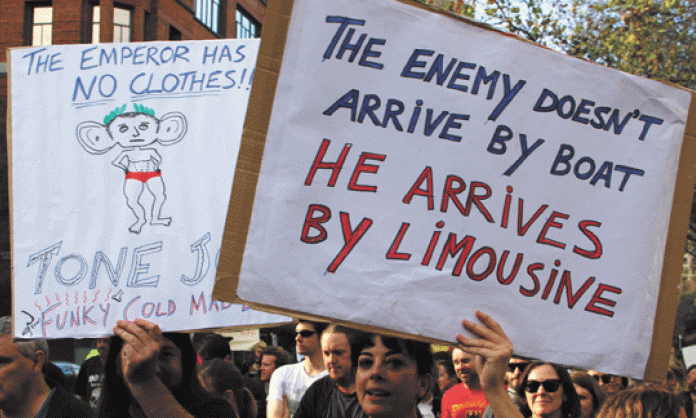For the bosses and their representatives in government, this budget is strategically important on two levels.
In the short term it is a direct assault on working class living standards and social services. Pensions are to be reduced, disability pensions cut and in times of sickness or unemployment, workers will face the indignity of being forced to turn to family or charity for support. Quality education will be increasingly out of reach for everyone but the super rich.
For all Joe Hockey’s talk about everyone pulling together and doing their bit, the real agenda is to leave workers and the poor out in the cold, make working life more degraded and create the conditions in which bosses can make even greater profits at our expense.
The long term agenda
The budget is also a major step towards a longer term goal of the Australian capitalist class: dismantling the historic gains made by workers in the post- World War Two period.
In the 30 years from 1914, capitalism was wracked by two world wars, a huge revolutionary wave and the Great Depression. The capitalist classes in the West were prepared to make major concessions to workers in an attempt to stabilise the system and head off further revolts.
In Australia, the welfare reforms introduced during the war, immediately after the war and right through to the 1970s were extensive and helped establish certain norms and expectations among the mass of people.
The arrangement was tolerable for the bosses so long as the economy was booming. But when worldwide recession hit in the mid-1970s, they went on the attack.
In the subsequent four decades, they have attempted to fundamentally transform society. The capitalist class and governments have done their best to keep a lid on workers’ living standards despite rising productivity, undermined bonds of social solidarity and trade unionism, pushed the market into every area of life, corporatised and privatised welfare, health and education services, and shifted government policy away from providing for workers and the poor towards subsidising corporations.
This budget is an attempt to accelerate and deepen this process. The vision of those at the Business Council of Australia and other peak industry bodies is to create a US-style sub-class of workers on poverty wages.
For example, last year the head of Abbott’s Business Advisory Council, Maurice Newman, argued that Australian workers had become too used to high wages and an industrial relations system that is “too rigid”. He claimed that “we have long since breached our salary cap, not just by the standards of our low-cost regional neighbours, but also our peers”.
Key in the efforts of Newman and Co. to force down wages is dismantling the welfare state. The stripping back of entitlements forces workers to take and stay in low paid jobs, and strengthens the hands of bosses to impose worse conditions.
In order to sell this assault to the public, the government is cynically attempting to compare Australia with basket case economies such as Greece. This is despite the fact that Australia’s debt to GDP ratio is one of the lowest in the OECD.
The Liberals do not want to bypass an opportunity to carry through austerity while they have the chance. This budget is thus both a gift to business and a means to ensure the capitalist class has a lower cost structure from which to make still more cuts in the event of an actual crisis in the future.
Never satisfied
Despite the budget’s savagery, the financial establishment, bosses’ lobby groups and right wing think-tanks are not satisfied. They are pushing for harsher attacks – both immediately and over the longer term.
In the words of Jennifer Westacott, chief executive of the Business Council of Australia, “The 2014-15 federal budget is a solid start ... But nobody should view this budget as a ‘set and forget’ exercise. It is just the start of a strategic change agenda.”
The ruling class has a vision for more cuts and austerity regardless of whether there is a recession and regardless of whether they succeed in pushing through every attack in this budget.
Undermining the living standards of workers is a central aspect of maintaining the profitability and competitiveness of industry. It is the brutal face of capitalism in the 21st century.
We should be able to take for granted the social safety net won during the post-war period. But the reality is that these gains represented a departure from the norm of capitalism, not its natural state. There simply is no way a system like this can work for the majority of people – the bosses are making that abundantly clear.









